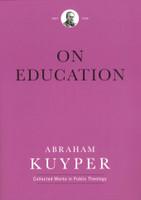
Kuyper, Abraham
What is the relationship between the church and the state?
As a theologian and pastor, Abraham Kuyper was greatly concerned about the state of the Dutch church in his time. As a politician and activist, he was equally concerned about the church’s role and influence in the modern world.
On the Church contains seven of Kuyper’s most important essays and speeches on the nature of the church. These newly translated works show Kuyper’s conviction that Christians must take an active role in the world, a world upheld by God’s common grace but standing in need of God’s particular grace in Christ. Christians must neither hide within the doors of their church buildings nor give in to the temptation to be active in earthly institutions alone.
An introductory essay by Ad de Bruijne answers how Kuyper’s doctrine of the church may be applied in the 21st century.
Table of Contents:
Author
Abraham Kuyper (1837–1920) was one of the most extraordinary individuals of his time. A prolific intellectual and theologian, he founded the Free University in Amsterdam and was instrumental in the development of Neo-Calvinism. He was also an active politician, serving as a member of Parliament in the Netherlands beginning in 1874 and serving as Prime Minister from 1901 to 1905.
At this intersection of church and state, he devoted much of his writing towards developing a public theology. His passion was to faithfully understand and engage culture through a Christian worldview. The most famous example is his articulation of the doctrine of common grace. His work has influenced countless others, including Francis Schaeffer, Cornelius Van Til, and Alvin Plantinga.